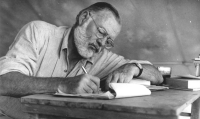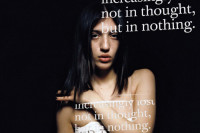
Writing SFF With Paper and Pen Spurs Memory and Creativity
sfwa.org – Tuesday April 23, 2024

I recently went back to something for the first time in many years: I wrote the entire first draft of two SFF works, a short story, and a novel, in longhand. There was an ease of flow to the writing that surprised me. A plethora of vocabulary jumped to the page. The memory of previous lines was prevalent, quickening my writing pace as the story grew, and the quality of the written words—the prose, oh, the prose!—sang.
But why?
Researchers for the last two decades have been exploring the benefits of using pen and paper. Writers have attested to them, too. Here are a few examples to help you decide if writing by hand is just what your own creative practice needs as well.

Ernest Hemingway’s Advice to Aspiring, Young Writers (1935)
openculture.com – Thursday April 11, 2024

Here in the twenty-twenties, a hopeful young novelist might choose to enroll in one of a host of post-graduate programs, and — with luck — there find a willing and able mentor. Back in the nineteen-thirties, things worked a bit differently. “In the spring of 1934, an aspiring writer named Arnold Samuelson hitchhiked from Minnesota to Florida to see if he could land a meeting with his favorite author,” says Nicole Bianchi, narrator of the InkWell Media video above. “The writer he had picked to be his mentor? Ernest Hemingway.”
What Hemingway offered Samuelson was something more than a literary mentorship. “This young man had one other obsession,” Hemingway writes in a 1935 Esquire piece. “He had always wanted to go to sea.” And so “we gave him a job as a night watchman on the boat which furnished him a place to sleep and work and gave him two or three hours’ work each day at cleaning up and a half of each day free to do his writing.” To Hemingway’s irritation, Samuelson proved not just a clumsy hand on the Pilar, but a fount of questions about how to craft literature — something Hemingway gives the impression of considering easier done than said.
Nevertheless, in the Esquire piece, Hemingway condenses this long back-and-forth with Samuelson into a dialogue containing lessons that “would have been worth fifty cents to him when he was twenty-one.” He first declares that “good writing is true writing,” and that such truth depends on the writer’s conscientiousness and knowledge of life. As for the value of imagination, “the more he learns from experience the more truly he can imagine.” But even the most world-weary novelist must “convey everything, every sensation, sight, feeling, place and emotion to the reader,” and that requires round after round of revision, so you might as well do the first draft in pencil.

The Importance of a Great Setting in Crime Fiction
crimereads.com – Monday April 1, 2024

Some years ago, I was working on a draft of my first real mystery thriller. In the opening pages, I included a bit of description meant to establish the location of the story (my hometown, Gainesville) and the time of year (late spring, the most miserable season in Central Florida). When I submitted the chapter to a writing workshop, one of the more experienced writers in the group immediately commented: “You need to cut all this setting stuff. Thriller fans don’t care about setting. They want to get to the action, quick.”
Like most writers, I passionately despise criticism of any kind, but this rankled more than most. It rankled, of course, because I knew that the writer who had made this comment (a very elegant and smart older lady with a couple of published novels under her belt) was partially right. Not about the “thriller readers don’t want to read about setting” part (I totally disagreed with that portion of her response; my disagreement is, in fact, the topic of this essay), but with the fact that I was rendering my novel’s setting improperly. That is, I was describing the setting in a very lazy and arbitrary manner, disconnected from what was actually happening in my main character’s mind or, for that matter, in the plot.

Not everyone has a novel in them
thecritic.co.uk – Friday March 22, 2024

Mrs Secret Author, who knows her onions, recently drew her husband’s attention to a Facebook post that, or so she claimed, simultaneously epitomised all that was best and all that was worst about the modern literary marketplace.
In it a woman — thankfully unknown to us — had decided to file her new year’s resolutions. One of them was to write “a Romance novel”. Clearly this was going to take a bit of time, but the aspiring novelist was confident that if she started now it would be possible to plan for a pre-Christmas launch.
All this, it turned out, had gone down a storm with the poster’s friends. To a man — well, actually to a woman — they rushed to assure her what a terrific idea it was. Several of them confided that they, too, had always wanted to write “Romance novels” and it was great that at least one of their number was about to get on with it.
And who was lined up to publish the darling work? Naturally, in this age of limitless technological horizons and level playing fields, the author was going to publish it herself.

Heavy Traffic is a radical new take on the literary magazine
dazeddigital.com – Tuesday March 19, 2024

There are no images. Instead, the cover star of New York magazine Heavy Traffic is a barrage of text gleaming against a black void, the words chopped up and winding around its edges. “She no longer had the language to describe what was happening,” it reads. “She murmured loudly to herself now, becoming increasingly lost not in thought, but in nothing.”
The literary magazine’s language, described by editor Patrick McGraw as “gibberish”, becomes increasingly haphazard and deranged as the pages turn (“Hard limit. Scarr-ed. sssh. whoAMiTALKingTO”). It almost feels like an IRL version of the infinite scroll, the words cascading through our brains like they do when flicking between feeds, tabs or messaging apps. We are a population that is becoming “increasingly illiterate”, McGraw writes in his editor’s letter. The new issue’s central occupation – not that the magazine officially has any themes – is to explore how language today has become detached from any meaning, beyond comprehension. “The more people see,” he writes, “the less they read.”

How to sustain a writers’ group
scottishbooktrust.com – Wednesday March 13, 2024

Games and fiction writer Gavin Inglis shares his top tips for running a writers' group that lasts.
Gavin Inglis has been in the same writers’ workshop since 1993. He shares some of the secrets that have helped keep it together all these years.
Make sure your writers' group has a focus
For a start, your group needs an identity so potential members can decide whether or not it suits them. Perhaps it is a friendly, open gathering dedicated to encouragement and support. Perhaps it is a private workshop which critiques commercial crime novels. It can be whatever works for the membership, but if it tries to be all things to all people, it will not have the cohesive force to endure.
People stick with writers’ groups because they are useful, and/or members enjoy the experience. Support, critique, networking. . . Understand what it is you do well, and move that to centre stage.

Lisa Gardner: 10 Lessons I Learned in 30 Years of Suspense Writing
crimereads.com – Wednesday March 13, 2024

When people first meet authors, they always ask the same question—how did you get started in this business? I’m a bit a rarity. Wrote my first novel at seventeen, sold it at twenty, hit the bestseller lists at twenty-eight. Trust me, if you’d told my 12-year old bookworm self, armed with a library pass and overactive imagination, that this would be my life, I never would’ve believed it. And yet, a sometimes heartbreaking, always incredible three decades later, here I am. Better yet, here’s what I’ve learned along the way.
1. Write from the Heart
Needless to say, I’ve sat through a lot of advice on trends over the years. Write whatever you want to write…but make it about vampires. Wait, domestic suspense is in…or is it international thrillers…unreliable narrators…books with the word girl/she/her in the title? These fads are all true and yet none of them matter. As writers, we think in story. Good news, so do readers. What is the best thing you can possibly be writing right now? The book that keeps knocking at your mental door. At seventeen, I had this scene I couldn’t get out of my head—a woman who ran a shelter for homeless youths, witnessing a murder one night, and the killer spotting her. Maybe other people dream of rainbows and fluffy bunnies, but clearly they were never meant for crime fiction.

On writing settings that crawl under the skin
crimereads.com – Thursday March 7, 2024

I once attended a writing seminar that claimed the landscape of your childhood home informs the way you move, think, and talk. A rocky, mountainous place might shorten your sentences into a rhythm that makes room for quick bursts of speed; a hot and humid landscape might lead you to consider your thoughts slowly, without straining yourself.
Embarrassingly, I have forgotten exactly who led this discussion (if you’ve attended something similar, please tell me!), but the idea has never left me—that, in the same way some people wind up looking exactly like their dogs, the place where you live can infect you to a deeper degree than you might have realized.
It’s by turns a comforting notion, and a disturbing one. What might you be carrying with you, subconsciously influencing your choices? And what if your relationship to those childhood landscapes isn’t altogether positive? I think of my grandmother, who, when asked about this concept at a dinner not long after, visibly recoiled from the question. Her early memories of Mississippi river flats and anything that land might have imprinted on her were not welcome at our table. She spent much of her life traveling, finally landing in New York, and only conceded to move as far south as Virginia because my brothers and I were children there.

Secret agents
thebookseller.com – Monday February 26, 2024

Literary agents are central to authors’ success — so why are we still considered a fringe benefit?
Recently I filmed an online course on "How to Get a Literary Agent" for our in-house creative writing school, Curtis Brown Creative. It was an enjoyable pause in my frenetic activities as a literary agent and c.e.o. of Curtis Brown Group to stop and reflect on the changing role of the literary agent during my 30 years at CB. Unsurprisingly, I concluded we agents are an essential part of the publishing process. Yet, why are literary agents considered so outside the system?
I say this because the first question I always ask to every new intern and assistant at CBG who has come off a MA in Publishing course is: “what did you learn about the role of the literary agent?”
The answer is always the same: “Oh, there was no mention of agents in the course but sometimes we get a session from a visiting agent."

Richard Charkin: Unintended Consequences in Publishing
publishingperspectives.com – Saturday February 24, 2024

Unintended Consequences in Publishing support Charkin’s Law: everything that can go wrong will go wrong.
HarperCollins’ announcement of a big increase in digital sales—largely downloadable audio and materially generated by the partnership with Spotify—made me contemplate the balance between decisions made with the best will in the world and their not-always-beneficial consequences.
I don’t know enough (I couldn’t know) about this particular deal, but is the offer of 15 hours a month of free audiobooks to Spotify customers a longer-term benefit to sales? What proportion of audiobook listeners actually listen to more than 15 hours a month? There will be some, of course, and Spotify might indeed increase the numbers of the hard-core audience but what happens to the rest?
With the benefit of an exceptionally helpful rear-view mirror, let’s think about other similar decisions.
Get the free newsletter | Submit a news item or article | Get Writers' News for your website





